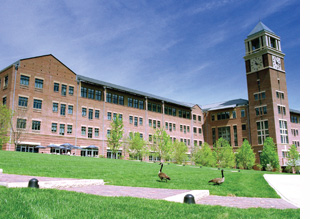Leading Industries
Diversity defines a regional economy, but even within that dynamic, some key sectors play outsized roles.
Research by the Federal Reserve Bank has demonstrated that the Kansas City region over the decades is often the last to enter a period of national economic decline, and among the first to exit those downturns.
Why? Diversity. We have auto makers here, but the local economy is not dominated by vehicle production—or subject to its ups and downs—as is Detroit’s. We have major banking and financial services operations here, but are not as dependent on them for regional prosperity as are New York or Charlotte, N.C. And while we’re home to one of the nation’s largest telecommunications companies, Sprint, the Kansas City area has been able to weather the long reduction in the work force of the region’s largest employer (from a high of more than 14,000 a decade ago to roughly 7,000 employed in the region today), and have even seen other companies spawned by the entrepreneurial zeal of former Sprint executives.
Within that diversity, however, several business sectors stand out:
Health care, for one. Among Kansas City’s 100 largest private companies and organizations, hospitals account for 11 spots just within the Top 40, and those organizations had combined revenues in excess of $13 billion in 2012.
Health-care informatics continues to be a huge growth area for Kansas City, largely through the presence of Cerner Corp., founded in 1979 and now a top employer in the region. The North Kansas City-based company recently completed a twin-tower complex that will bring 4,000 workers to Wyandotte County, and has secured $1.2 billion in public assistance to go with its own $2.9 billion commitment to a major office complex in south Kansas City. And NetSmart Technologies, providing software to behavioral-health organizations, is on a rapid-growth course after moving here from New York and making former Cerner executive Mike Valentine its chief executive.
The life sciences cast a wide shadow across the region, not just with human health research at medical institutions and companies spun off by it, but with animal health. More than a third of the world’s $19 billion in animal-health sales are generated by companies with operations in the Kansas City region.
The insurance sector is well-represented, with two Blue Cross Blue Shield organizations, Security Benefit Life Insurance, Government Employees Health Association and the Lockton Companies, the world’s largest privately held independent insurance brokerage. Combined revenues: more than $12 billion.
Among the Top 100 companies, engineering casts a $7.4 billion footprint—executives here say Kansas City has more engineers per capita than any other city in the world—with notable global players like Black & Veatch, Burns & McDonnell, HNTB and Terracon leading that sector.
Construction? Led by J.E. Dunn Construction Company, the Top 100 boasted nearly a dozen contractors with $7.8 billion in revenues in 2012. Dunn is a locally based contractor operating nationally, but national firms like Turner Construction, Nabholz Construction and the Weitz Co. all have operations here.
All of that, however, pales in comparison to what agribusiness means to Kansas City. Numbers 1–4 on that same Top 100 list are held by companies in the agribusiness sector, including top-ranked Dairy Farmers of America, a $12.1 billion behemoth as a national dairy cooperative. Associated Wholesale Grocers, National Beef Packing Co. and Lansing Trade Group, a commodities trading and shipping concern, round out those first positions. Other players like Bartlett Grain Co. and Triumph Foods help push the agribusiness impact of those select organizations to nearly $39 billion.
And that’s before you factor in organizations farther down the food production chain, like retailers NPC International (the world’s largest Pizza Hut franchisee) and KPB Foods, the nation’s second-largest KFC chain.
Layered over all of that is an impressive transportation and distribution infrastructure. Thanks in large part to its central location and open access to interstate and rail shipping, the business make-up of metropolitan Kansas City is shaped by the predominant areas of trade, transportation and utilities, according to the Bureau of Labor Statistics’ definition of economic super sectors.
In a Word: Stability
Overall, that broad business mix provides a remarkable economic stability in the face of national economic swings. And that’s a quality highly prized by executives seeking environments that facilitate their long-range plans for both operations and expansion.
Major manufacturing employers include Hallmark Cards, founded in Kansas City in 1910, as well as American Italian Pasta, the largest producer of pasta in North America, assembly plants for both General Motors (in the Fairfax Industrial District on the Kansas side) and Ford Motor Co. (with its Claycomo plant in Missouri).
And, as in most major urban areas, government plays a major role in the work force. In addition to being the regional center for many federal departments, Kansas City is bracketed by military bases like Whiteman Air Force Base near Sedalia, Mo., and Fort Leavenworth. Combined with state, municipal and local offices, those public-sector positions account for more than 40,000 workers in the region.
Other large employers hail from higher education and the K–12 ranks, including the University of Kansas and the many public school districts in the two Kansas Citys and their surrounding suburbs. ![]()
